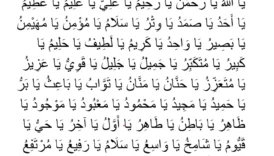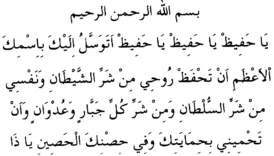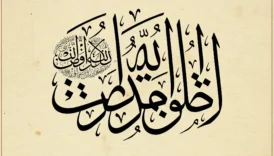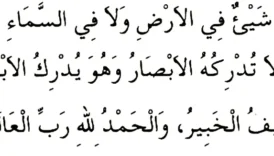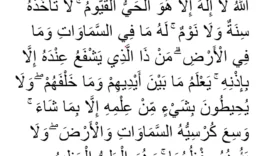The Hidden Wisdom and Secrets Within Ayat al-Kursi
The Kursi Represents a Realm
According to a narration from Ali (r.a.), the Prophet Muhammad (peace be upon him) said:
- The Hidden Wisdom and Secrets Within Ayat al-Kursi
- The Kursi Represents a Realm
- A Narration from Ibn Majah
- When Allah’s Command Descends Upon the Kursi
- According to Muhyiddin ibn ‘Arabi on the Descent of the Divine Command
- The Virtue of Ayat al-Kursi
- Seven Fortress-Like Protections in Ayat al-Kursi
- Revealed with Seventy Thousand Angels
- The Greatest Verse in the Qur’an
- Reciting Ayat al-Kursi for Protection from All Dangers
- “If There Were No Death, You Would Enter Paradise Immediately”
- Attaining a Martyr’s Departure
- The Ayat al-Kursi Supplication
- Arabic Text:
- Transliteration:
- Meaning (English):
- To Silence a Tyrant: Ayat al-Kursi
- Ayat al-Kursi as a Remedy for Illness
- For Acceptance of Prayers
- Driving Away Sorcerers and Devils
- It Protects Not Only One’s Own Home but Also Nearby Houses
- Protected by 70,000 Angels
- The Ism al-A‘zam (Greatest Name) in Ayat al-Kursi
- Fulfilling Needs and Desires
- Opening the Spiritual Eye
- Gaining Creation’s Obedience
- Seeking the “‘Ilm al-Ladun” (Mystical Knowledge)
- Wearing Ayat al-Kursi
- Burning a Jinn with Ayat al-Kursi
- The Companion Who Defeated a Jinn by Reciting Ayat al-Kursi
- A Morning Shield
- Enhancing Memory and Learning
- Reciting Ayat al-Kursi Daily
- Sample Book References
- Final Reflections
“Allah (glorified and exalted be He) created the Kursi (the Divine Footstool) from pearls. Its magnitude is beyond the comprehension of anyone except the Almighty Lord Most High.”
(See: Imam Bayhaqi, Al-Asma wa’s-Sifat, p. 362)
In another hadith, the Prophet (peace be upon him) states:
“The seven heavens and the seven earths, compared to the Kursi, are like a small ring lying in the midst of a desert.”
(See: Ibn Majah, Muqaddimah, 13)
A Narration from Ibn Majah
Ibn Majah (may Allah have mercy on him) transmits that the Prophet (peace be upon him) also said:
“The light of the sun is but one part out of seventy parts of the light of the Kursi. And the light of the Kursi is only one part out of seventy parts of the light of the ‘Arsh (the Divine Throne). Between the bearers of the ‘Arsh (Hamalat al-‘Arsh) and the Kursi, there are 140 veils: 70 of them made of light and 70 of darkness. Each veil is separated by a distance of 500 years of travel. If it were not for these veils between the Kursi and the ‘Arsh, the angels of the Kursi would be burned by the brightness of the ‘Arsh.”
(See: Ibn Majah, Muqaddimah, 13)
When Allah’s Command Descends Upon the Kursi
The seven heavens and the seven earths vanish in comparison to the ‘Arsh (the Supreme Throne). One can liken the ‘Arsh to the palace of the Almighty Lord—He gives His commands from there. When the Divine Command descends upon the Kursi, it is said to produce a sound akin to heavy chains falling on a marble floor. The angels of the Kursi faint due to the majesty of Allah’s decree and the thunderous sound. When they regain consciousness, they ask the angels by the ‘Arsh, “What has our Lord commanded?” Those angels respond, “He has commanded what is right and true.”
From there, the Divine Command travels to Sidrat al-Muntaha (the Lote Tree of the Utmost Boundary) and proceeds down through each sky until it reaches the earthly realm. Imam al-Sha’rani (may Allah have mercy on him) explains that if this command were to come straight to the world without stopping at each sky, creation would be annihilated by its sheer intensity.
According to Muhyiddin ibn ‘Arabi on the Descent of the Divine Command
Shaykh Muhyiddin ibn ‘Arabi (may Allah sanctify his secret) remarks that the Divine Command descends through five stations:
- Al-Qalam al-A‘la (The Supreme Pen): Where obligations (fard) are decreed.
- Al-Lawh al-Mahfuz (The Preserved Tablet): Where recommended acts (mandub) are decreed.
- The ‘Arsh (Divine Throne): Where prohibitions (haram) are decreed.
- The Kursi: Where disliked acts (makruh) are decreed.
- Sidrat al-Muntaha: Where permissible and neutral acts (halal and mubah) are decreed.
The Virtue of Ayat al-Kursi
The Prophet (peace be upon him) said:
“Reciting Ayat al-Kursi once is equivalent to reciting a thousand verses of the Qur’an.”
(See: Tirmidhi, Fada’il al-Qur’an, 2)
There is also a famous narration involving Ka‘b (r.a.):
The Messenger of Allah (peace be upon him) asked Ka‘b, “O Abu al-Mundhir! Which verse in the Book of Allah is the greatest?” Ka‘b answered, “Allah and His Messenger know best.” When the Prophet asked again, Ka‘b recited Ayat al-Kursi. The Prophet (peace be upon him) placed his blessed hand on Ka‘b’s chest and said, “May this knowledge bring you ease.”
(See: Muslim, Musafirin, 258)
Another hadith conveys:
“When a believer recites Ayat al-Kursi, Allah enlightens their grave, expands it, and grants them an immense reward. For every letter of this verse, Allah creates an angel that will continue seeking forgiveness for the reciter until the Day of Judgment.”
(See: Abu Nu‘aym, Hilyat al-Awliya, vol.4, p. 237)
The Prophet (peace be upon him) also taught:
“Surely Ayat al-Kursi has a tongue. Whenever a believer recites it, the verse prostrates beneath the ‘Arsh and petitions forgiveness for the one who recited it.”
(See: Tabarani, Al-Mu‘jam al-Kabir, vol. 20, p. 135)
Seven Fortress-Like Protections in Ayat al-Kursi
In another hadith, the Prophet (peace be upon him) declared:
“Ayat al-Kursi contains seven fortress-like protections.”
(See: Abu Yusuf, Fadilah Ayat al-Kursi)
Even a single sincere recitation can act as though seven impenetrable fortresses were built around the person. One can only imagine the spiritual benefits of reciting it frequently.
Revealed with Seventy Thousand Angels
Owing to its virtues and mysteries, Ayat al-Kursi was reportedly revealed to the Prophet (peace be upon him) accompanied by 70,000 angels.
(See: Al-Bazzar, Musnad, no. 892)
The Greatest Verse in the Qur’an
The Prophet (peace be upon him) said:
“The greatest verse in the Qur’an is Ayat al-Kursi. Whoever recites it, Allah (glorified and exalted be He) appoints an angel on their behalf. This angel continues to record good deeds and erase bad ones until the time they recite it again the next day.”
(See: al-Nasa’i, Amal al-Yawm wa’l-Laylah, no. 100)
Reciting Ayat al-Kursi for Protection from All Dangers
Reading Ayat al-Kursi before prayer helps the worshipper perform salah (prayer) with tranquility. By Allah’s grace, it repels the whisperings of Satan. It is believed to protect the reader from misfortune, calamities, and the evil of the devil. According to Islamic tradition, Satan has seventy “calves” or different forms of deception; the protective power of divine remembrance and prophetic supplications is vital to preserving one’s faith from these evils.
“If There Were No Death, You Would Enter Paradise Immediately”
A hadith states:
“Whoever recites Ayat al-Kursi after every obligatory prayer remains under the protection of the Almighty until the next prayer.”
(See: Tabarani, Al-Mu‘jam al-Kabir, vol. 20, p. 212)
And another narration teaches:
“Whoever recites Ayat al-Kursi after every obligatory prayer—if death did not exist, they would enter Paradise directly.”
(See: Nasa’i, Sunan, vol. 2, p. 195)
Attaining a Martyr’s Departure
Abu Umamah (r.a.) reports the Prophet (peace be upon him) said:
“Whoever recites Ayat al-Kursi after the five daily prayers, Allah will take their soul the way He takes the souls of His prophets who are martyred on the battlefield. If someone recites it every morning and evening, the angels will say on the Day of Resurrection, ‘O Lord! This servant never died. We never once saw them in the worldly realm!’”
(See: Ibn Hajar al-‘Asqalani, Muqaddimah, p. 62)
The Ayat al-Kursi Supplication
Arabic Text:
اَللَّهُمَّ إِنِّى أُقَدِّمُ إِلَيْكَ بَيْنَ يَدَىْ كُلِّ نَفَسٍ وَ لَمْحَةٍ وَلَحْظَةٍ وَ طَرْفَةٍ يَطرِفُ بِهَا أَهْلُ السَّمَاوَاتِ وَ أَهْلُ الْاَرْضِ وَكُلِّ شَىْءٍ هُوَ فِى عِلْمِكَ كَائِنٌ اَوْقَدْ كَانَ أُقَدِّمُ إِلَيْكَ بَيْنَ يَدَىْ ذَلِكَ كُلِّهِ
Transliteration:
Allahumma innī uqaddimu ilayka bayna yaday kulli nafasin wa lamḥatin wa laḥẓatin wa ṭarfatin yaṭrifu bihā ahlu-s-samāwāti wa ahlu-l-arḍ, wa kulli shay’in huwa fī ‘ilmika kā’inun aw qad kāna. Uqaddimu ilayka bayna yaday dhālika kullih.
Meaning (English):
“O Allah, I present to You—before every breath, every moment, and every blink of the eyes of those in the heavens and on the earth, and before anything that exists in Your knowledge, whether it is yet to exist or has already come to pass—my recitation of Ayat al-Kursi.”
After making this supplication, one recites Ayat al-Kursi to the end. The Prophet (peace be upon him) is reported to have said:
“Every hour of the night and day, seventy million good deeds (hasanat) rise up from that servant to Me. Until Israfil (peace be upon him) blows the Trumpet, the angels remain busy recording these rewards.”
(See: Imam al-Buni, Majmu‘at al-Ahzab, p. 211)
To Silence a Tyrant: Ayat al-Kursi
If someone fears oppression from a tyrant, they can recite Ayat al-Kursi along with the invocation:
“Ya Hayyu, ya Qayyum, ya Badi‘as-samawati wa’l-ard, ya Dhal-Jalali wa’l-Ikram…
O my Lord! By the sanctity of this noble verse and the Most Beautiful Names within it, restrain the tongue of this oppressor. Lock his mouth. Let him speak nothing but kindness regarding me.”
Then one enters the tyrant’s presence, trusting that Allah will, in effect, render that person mute and harmless.
Ayat al-Kursi as a Remedy for Illness
In cases of heart pain, breathing troubles, or stomach ailments, one may write Ayat al-Kursi three times on a clean dish, wash off the ink with pure water, and drink it. While drinking, the person intends the cure, for example: “I drink this for healing from my stomach pain,” trusting that Allah, the Most High, will grant relief.
For Acceptance of Prayers
Anyone who, on Friday after the ‘Asr (afternoon) prayer, recites Ayat al-Kursi 17 times in a quiet place may experience unusual spiritual states. If they make a du‘a (supplication) at that moment, it is highly likely to be accepted.
Driving Away Sorcerers and Devils
The Prophet (peace be upon him) taught:
“Whoever recites Ayat al-Kursi when leaving their home will remain under Allah’s protection until they return. In the house where this verse is recited, devils cannot enter for thirty days and no sorcerer (male or female) can enter for forty days.”
(See: Daylami, Firdaws al-Akhbar, vol. 5, p. 475)
It Protects Not Only One’s Own Home but Also Nearby Houses
The Prophet (peace be upon him) addressed Ali (r.a.) saying:
“O ‘Ali, teach Ayat al-Kursi to your children, your spouses, and your neighbors. No verse greater than it has ever been revealed. Whoever recites it before going to sleep will have their own self, their neighbors, and even neighboring houses protected from all harm. The best of speech is the Qur’an, and the best surah in the Qur’an is Surah al-Baqarah. The best part of Surah al-Baqarah is Ayat al-Kursi.”
(See: Imam Malik, Muwatta, vol.2, p. 986)
Protected by 70,000 Angels
When a believer fears their enemies or even predatory animals, reciting Ayat al-Kursi ensures Allah sends 70,000 angels to guard them. These angels will intercede for that person and keep them safe from what they fear. Moreover, whoever recites it upon leaving home, and again when returning, is protected from poverty by Allah’s grace.
The Ism al-A‘zam (Greatest Name) in Ayat al-Kursi
Ali (r.a.) relates:
“During the Battle of Badr, I came to the Prophet (peace be upon him) and saw him prostrate, repeatedly invoking, ‘Ya Hayyu, ya Qayyum’ (O Ever-Living, O Sustainer). I checked on him multiple times during the battle, and each time he was persevering in this same invocation. By that prayer, Allah granted us victory.”
(See: Ibn Qutaybah, Ta’wil Mukhtalif al-Hadith, p. 114)
Ibn ‘Abbas (r.a.) explains:
“The greatest names of Allah are ‘Ya Hayyu, Ya Qayyum.’ If there were any names greater than these, the Prophet (peace be upon him) would have certainly used them.”
(See: Imam al-Ghazali, Al-Maqsad al-Asna, p. 45)
Fulfilling Needs and Desires
Allah rushes to the aid of those in distress when they recite Ayat al-Kursi. Some narrations mention that if someone faces hardship and turns toward the Qiblah in the middle of the night to recite Ayat al-Kursi 170 times, Allah will ease their burdens and grant their wishes.
Opening the Spiritual Eye
Muhyiddin ibn ‘Arabi (may Allah sanctify his secret) states:
“Whoever recites Ayat al-Kursi 1,000 times daily for 40 consecutive days—by Allah, by the Qur’an, and by His Noble Messenger—I testify that their spirit will awaken, and the eyes of their heart will open. Angels will visit them, and they will achieve every righteous goal.”
(See: Ibn ‘Arabi, Futuhat al-Makkiyyah, vol.2, p. 527)
Gaining Creation’s Obedience
Muhyiddin ibn ‘Arabi, Saduddin al-Taftazani, and Imam al-Buni say:
“If a person recites Ayat al-Kursi according to the number of its letters (170 times) or the number of the messengers (313 times), by Allah’s permission, everything in the heavens and on earth will submit to them. Enemies will be unable to harm them in word or deed.”
(See: Imam al-Buni, Shams al-Ma‘arif, p. 312)
Seeking the “‘Ilm al-Ladun” (Mystical Knowledge)
If someone recites Ayat al-Kursi 18 times a day, Allah revives their heart with the light of Tawhid (Oneness) and fills it with wisdom and divine knowledge (ladun). They also receive blessings in their sustenance and gain high standing among people.
(See: Imam al-Buni, Asrar al-Mufidah, p. 44)
Wearing Ayat al-Kursi
A person who writes Ayat al-Kursi and carries it (on a necklace, amulet, or otherwise) will, by Allah’s leave, be protected from calamities, accidents, and the harm of malevolent spirits.
Burning a Jinn with Ayat al-Kursi
Imam al-Ghazali quotes Imam Qutaybah, who quotes a man from the Banu Ka‘b tribe:
“I went to Basra to sell dates and found an abandoned house to rent. The owner warned me of an evil jinn (ifrit) living there who harmed everyone who entered. I replied, ‘Allah shall protect me.’ That night, a pitch-black, fiery entity approached me. I started to recite Ayat al-Kursi. At first, it echoed each phrase with me, but when I reached:
‘وَلَا يَؤُودُهُ حِفْظُهُمَا وَهُوَ الْعَلِيُّ الْعَظِيمُ’
(Transliteration: ‘Wa lā ya’ūduhu ḥifẓuhumā wa Huwa al-‘Alīy al-‘Aẓīm’),
the jinn couldn’t continue and disappeared into the darkness. In the morning, I saw a burnt trace of ash where it had stood. A voice said, ‘You burned that great unbelieving jinn!’ When I asked how, the voice replied, ‘By repeatedly reciting “wa Huwa al-‘Alīy al-‘Aẓīm.”’”
(See: Imam al-Ghazali, Ihya’ ‘Ulum al-Din, vol.1, p. 321)
The Companion Who Defeated a Jinn by Reciting Ayat al-Kursi
According to a narration from ‘Abdullah ibn Mas‘ud (r.a.):
“A Companion of the Prophet (peace be upon him) once fought with a jinn and subdued it. The jinn asked for a rematch, promising if it lost again, it would share something beneficial. They fought again, and the Companion defeated it. The jinn then asked, ‘Do you recite Ayat al-Kursi?’ The Companion replied, ‘Yes.’ The jinn said, ‘The house where it’s recited is off-limits to devils— they run away like a donkey flees a beating.’”
(See: Abu Dawud, Sunnah, 17)
A Morning Shield
‘Umar ibn al-Khattab (r.a.) reportedly taught:
“Whoever, upon rising in the morning, recites Ayat al-Kursi once and symbolically places it around themselves in eight directions—front, back, right, left, above, below, inside, and outside—no person can harm them that day, and they remain calm even if calamity befalls the world outside.”
(Narrated in: Imam al-Suyuti, Al-Hawi lil-Fatawi, p. 295)
Enhancing Memory and Learning
When struggling to repel harm or improve understanding and intelligence, reciting Ayat al-Kursi is recommended. Imam al-Buni (may Allah have mercy on him) says:
“For increasing intellect and comprehension, recite it 50 times over some water and then drink that water. By Allah’s grace, both cognition and memory will improve.”
(See: Imam al-Buni, Asrar al-Huruf, p. 89)
Reciting Ayat al-Kursi Daily
It is said that if a person recites Ayat al-Kursi a hundred times each day, they will begin to experience spiritual unveilings. The Prophet (peace be upon him) advised his companions:
“When you go to your bed at night, recite Ayat al-Kursi. Allah will appoint an angel to protect you from Satan until morning.”
(See: al-Bukhari, Wakala, 10)
Sample Book References
- Imam Malik. Al-Muwatta’.
- Ibn Majah. Sunan.
- Tirmidhi. Fada’il al-Qur’an.
- Nasa’i. Amal al-Yawm wa’l-Laylah.
- Al-Bazzar. Musnad.
- Tabarani. Al-Mu’jam al-Kabir.
- Imam al-Ghazali. Ihya’ ‘Ulum al-Din and Al-Maqsad al-Asna.
- Muhyiddin ibn ‘Arabi. Futuhat al-Makkiyyah.
- Imam al-Buni. Shams al-Ma‘arif, Asrar al-Huruf, Asrar al-Mufidah, Majmu‘at al-Ahzab.
- Ibn Qutaybah. Ta’wil Mukhtalif al-Hadith.
- Daylami. Firdaws al-Akhbar.
- Abu Yusuf. Fadilah Ayat al-Kursi.
- Al-Bukhari. Sahih.
- Imam al-Suyuti. Al-Hawi lil-Fatawi.
Final Reflections
All these narrations, verses, and supplications underscore the exalted status and profound benefits of Ayat al-Kursi. Ultimately, only Allah knows the full extent of its secrets. When recited with reflection and sincerity, Ayat al-Kursi can unlock a myriad of blessings and divine graces. May the Almighty enable us to recite, understand, and embrace its mysteries. Ameen.
